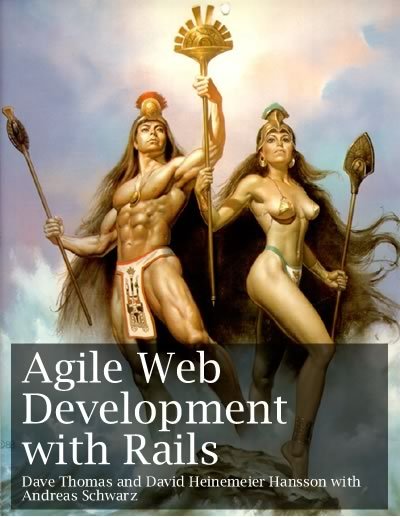I decided a while back to publish the music I’m writing, if nothing else as a way of keeping myself honest. So, here’s a little piece of fluff I wrote just to play with time signatures—alternating 5/8 and 6/8 has a nice drive to it. It’s played by my music teacher.
Thursday, December 25, 2008
Saturday, December 20, 2008

Like the rest of our publishing business, I like to keep our covers simple and easy. But now I realize that these covers fail to capture the true epic nature of our books. Joey deVilla posted some reworkings of book covers last year, but I only came across them today. I’m inspired…
The strange thing is: I’m not sure where he got hold of the image. After we posed for the picture, DHH and I thought better of it. We thought we had destroyed all the copies…
Tuesday, December 16, 2008
Ruby 1.9 can check your indentation
All Ruby programmers regularly encounter the mystical error “syntax error, unexpected $end, expecting keyword_end.” We know what it means: we left off an end somewhere in the code. As Ruby compiled our source, it keeps track of nesting, and when it reached the end of file ($end), it was expecting to see one more end keyword, and none was there.
So, we trundle back through the source, and after a while discover we’d deleted just one too many lines during that last edit.
Ruby 1.9 makes that easier. For example, here’s a source file:
class Example
def meth1
if Time.now.hours > 12
puts “Afternoon”
end
def meth2
# …
end
end
Run it through Ruby 1.9, and you’ll get the same old error message:
dave[RUBY3/Book 8:26:48*] ruby t.rb
t.rb:10: syntax error, unexpected $end, expecting keyword_end
But add the -w flag, and things get more interesting.
dave[RUBY3/Book 8:26:51*] ruby -w t.rb
t.rb:5: warning: mismatched indentations at ‘end’ with ‘if’ at 3
t.rb:9: warning: mismatched indentations at ‘end’ with ‘def’ at 2
t.rb:10: syntax error, unexpected $end, expecting keyword_end
It’s the small things in life…
Monday, December 1, 2008
Forking Ruby—my RubyConf Keynote is now up
There’s a sound that no presenter wants to hear, and that’s dead silence. And that’s what greeted me when I made the suggestion in my RubyConf keynote that the community should fork the Ruby language. I think by the end of the talk, though, most people were convinced.
Am I anti Ruby? no.
Am I suggesting Matz is doing a bad job? Not in the least.
But I do think the complexity of the current language inhibits experimentation with language features. Want to implement parallel Ruby? If you do it with the current syntax and semantics, you’ll be struggling with the integration of global variables, the non-threadsafe nature of require, continuations, and so on, and so on. So before starting these kinds of experimental projects, I’m saying we should fork the language. Produce variants that let us focus in on the aspects under test. Make the new language a rich-enough subset that you can do useful work with it. Then let people play with it. Maybe the ideas are stellar, in which case we can all talk about integrating the changes back into the mainline language. And maybe the idea didn’t pan out, in which case we can quietly forget it, and we’ve done no damage to the language itself.
A mutation is an altered fork of the original. And mutations are essential to the diversity and strength of a genetic line over time. Let’s not be afraid to create Ruby mutants and let them compete.
The keynote is available from Confreaks.